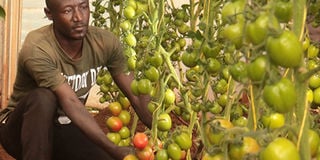Lessons galore at the show

A worker tends to tomatoes inside a green house at Wambugu Agriculture Training Institute in Nyeri.PHOTO|JOSEPH KANYI|NMG
What you need to know:
New greenhouses that come with CCTV cameras through which farmers can monitor their ventures via mobile phones
When the curtains fell on the Nakuru ASK show last week, farmers were the biggest winners.
They went back home having picked invaluable lessons from trainers on new farming technologies, better crop varieties, diseases and pest control and marketing.
Goldenscape Limited was among the 150 exhibitors at the event. The firm showcased their greenhouses that come with CCTV cameras through which farmers can monitor their ventures via mobile phones.
The facility also has sensors that control humidity and temperatures, saving farmers the hustle of running them, according to agronomist Hilda Wacera.
At the Egerton University stand, the institution showcased an improved variety of spider plant (saga), a popular traditional vegetable. Jacob Ochieng, from the department of crops, horticulture and soils, said spider plant is a critical plant because of its high iron content.
“The university has so far conducted research in six seasons and six more are still pending before the variety is released into the market. The harvest at the research farm shows a steady increase, the height and the flowering has also been increasing indicating the variety is good,” said Ochieng’.
The university is also adopting pepino melon from Italy for growing in various parts of the country.
“It takes about four months to mature and is harvested continuously for a similar duration,” he said, adding about 2kg of pepino melon is harvested per plant.
At Toyota Tusho, farmers were introduced to the latest brand of small tractors popularly known as Captain and Case.
“The two tractors are designed for small-scale farmers with little parcels of land, which they can use for transport, harrowing and planting,” said Samuel Ndunga, a sales consultant at the firm.
The official said the small tractor is ideal for potato harvesting, planting, spraying and bailing.
At the Ministry of Agriculture and Kenya Prisons stands, urban farming concepts took the centre-stage.
“With large populations in urban areas, it means land is diminishing but people can still plant vegetables such as sukuma wiki, onions and cabbages on their balconies using drip irrigation from waste bottles. This saves a lot of water,” said Nancy Rotich, an official.
Young farmers jammed the rabbit corner at the ministry’s stand to receive tips on keeping the animals.
Nancy Wangare, a livestock production officer at Gilgil sub-county, said rabbit rearing requires a small space, with a 10 by 10 feet cage holding 100 rabbits. “Farmers should use dry feeds and pellets and minerals for the rabbits to get a balanced diet and to curb bloating, which can kill,” she said. Farmers who visited the Kenya Agriculture Livestock and Research Organisation (Kalro) stand learnt conservation agriculture techniques.
“We are discouraging farmers from using discs to reduce disintegration of the soil to curb soil erosion and loss of moisture,” said an official.
He noted after harvesting, one should not burn or remove all the weeds or allow their animals to eat the residues since when they rot, they increase carbon content in the soil and that is part of the nutrition for the plant and soil.
Farmers were also advised to use main crops such as legumes and root crops like carrots and dry crops like millet for crop rotation.




